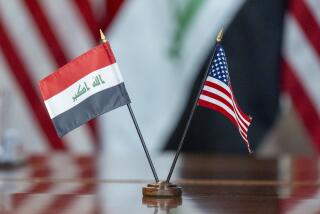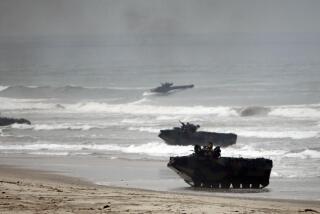Wounded Recall a Moment That Changed Lives
- Share via
WASHINGTON — One moment, 60 half-clad and grinning Iraqi prisoners were dancing around Lance Cpl. Charles Weatherman in the Kuwaiti desert, shouting “George Bush No. 1! George Bush No. 1!”
The next, mortar rounds were exploding everywhere, spraying metal fragments that cut down half a dozen of his fellow platoon members. One struck Weatherman in the neck. “I thought I was a goner,” the Waynesville, N.C., native said Wednesday.
In an instant, the first day of Operation Desert Storm turned from the semicomic to the nearly tragic for the 20-year-old Marine, one of the first combat troops to return home from the Persian Gulf this week.
Weatherman, who was stationed at Camp Pendleton before the war, is recuperating at Andrews Air Force Base in Maryland. A converted indoor tennis court and gymnasium have become temporary quarters for wounded GIs who are reaching the base at a rate of three planeloads a day.
Weatherman, one of three wounded soldiers made available for interviews Wednesday, said the deadly encounter occurred on Feb. 24 at dusk, after his 1st Marine Division platoon had punched 15 miles into Kuwait.
The Iraqi prisoners had been living on desert grasses and rainwater and were delighted to surrender. But when Iraqi mortar rounds began arching into U.S. positions from slightly more than a mile away, the POWs fell flat and begged the Americans not to retaliate against them.
“Don’t kill us! Don’t kill us,” they cried.
Weatherman, who has been in the Marines for 26 months, heard the low whistles and dull pops that infantrymen recognize as mortar fire.
At first, he didn’t know he had been hit. But when he tried to turn his gun, he found he couldn’t. Suddenly, he felt the searing heat of the shrapnel in his neck.
It was a serious wound, and Weatherman’s family in North Carolina was worried when an officer at the Marine recruiter’s office called them with the news. After 11 days, Weatherman is now able to get up and walk.
Another wounded soldier, Army Specialist Angel Noe Alvaraz, told how his unit was hit by mortar fire from Iraqis who didn’t know--or didn’t care--that they were shooting at American troops who had captured scores of their fellow countrymen.
Alvaraz, a member of the 1st Cavalry from McAllen, Tex., was about 30 miles inside enemy territory two days before the ground war began. Six Bradley Armored Vehicles had been sent on a mission to scout out enemy mines, artillery and infantry positions.
They poked through a network of bombed-out and foul-smelling Iraqi bunkers and foxholes, where they found a litter of abandoned weapons, mines and teapot-shaped helmets. Suddenly, a crowd of Iraqi troops appeared with a white flag, asking--in perfect English to Alvaraz’s astonishment--”Are you all Americans?”
The soldiers had some trouble searching and disarming the Iraqis. They told them five or six times to lie flat on the ground. But the Iraqis decided for some reason that they needed to stand up.
Then the mortar shelling began. The gunner in Alvaraz’s vehicle was hit by shrapnel, as were a half-dozen others in the group. Alvaraz, who was outside his vehicle, was riddled with metal fragments in both legs and hands.
Before he fell to the ground unconscious, Alvaraz was aware that he could only move one hand. “I thought I was a goner too,” he said. The soldier was unconscious for a day and a half, and spent many days only partially aware of his surroundings.
Still confined to a wheelchair, Alvaraz was wearing a hospital bracelet around his wrist and a Purple Heart on his camouflage fatigues when he talked to reporters. “I’ll never do that again,” he said slowly, then added: “Unless I have to do that again.”
Marine Lt. Kevin J. Anderson was wounded as his unit of the VII Corps tried to break through a fence into the Kuwait airport on Feb. 25. He was hit with fragments of an artillery shell in two places on his shoulders and once on the side of his face.
Anderson said he knew that no vital organs had been hit, so he stayed on his feet, trying to direct the Marines in his unit. Finally, someone saw that he was hit and told him to get on the ground.
Andrews Air Force Base has handled about 300 wounded GIs since the Persian Gulf War began and expects about 1,000 more.
More to Read
Sign up for Essential California
The most important California stories and recommendations in your inbox every morning.
You may occasionally receive promotional content from the Los Angeles Times.














